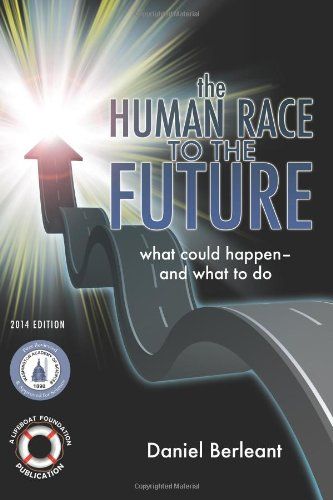
Category: government


Justice Beyond Privacy
As the old social bonds unravel, philosopher and member of the Lifeboat Foundation’s advisory board Professor Steve Fuller asks: can we balance free expression against security?
Justice has been always about modes of interconnectivity. Retributive justice – ‘eye for an eye’ stuff – recalls an age when kinship was how we related to each other. In the modern era, courtesy of the nation-state, bonds have been forged in terms of common laws, common language, common education, common roads, etc. The internet, understood as a global information and communication infrastructure, is both enhancing and replacing these bonds, resulting in new senses of what counts as ‘mine’, ‘yours’, ‘theirs’ and ‘ours’ – the building blocks of a just society…
Read the full article at IAI.TV

Getting Sexy and the Undivided Attention of Your Fortune-500 Client CEOs! Aug 22 2014
Getting Sexy and the Undivided Attention of Your Fortune-500 Client CEOs! (Excerpt from the White Swan book) By Andres Agostini at www.linkedin.com/in/andresagostini
(1.- of 17 ).- If you want to seize the undivided attention of top executives at Los Alamos National Laboratory and Procter & Gamble, talk to them through the notions of and by Process Re-engineering.
(2.- of 17 ).- If you want to seize the undivided attention of top executives at GE, talk to them through the notions of and by Six Sigma, and Peter F. Drucker’s Management by Objective (MBO). While you are with them, remember to commend on the Jack Welch’ and Jeff Immelt’s master lectures at GE’s Crotonville.
(3.- of 17 ).- If you want to seize the undivided attention of top executives at RAND Corporation and HUDSON Institute, talk to them through the notions of and by Herman Khan’s (Dr. Strangeloves’) Scenario Methodology.
(4.- of 17 ).- If you want to seize the undivided attention of top executives at Mitsubishi Motors and Honda and Daimler-Chrysler’s Mercedes-Benz, talk to them through the notions of and by Kaisen.
(5.- of 17 ).- If you want to seize the undivided attention of top executives at NASA and DARPA and the Industrial-Military Complex, talk to them through the notions of and by Systems Approach with the Perspective of Applied Non-Theological Omniscience. And, also, want to get funded by DARPA? How? The pathway is extremely easy and promissory. Just give them an unimpeachable real-life demonstration of how to “violate” the Laws of Physics correctly and frequently, for Life!
(6.- of 17 ).- If you want to seize the undivided attention of top executives at Lockheed Martin, talk to them through the notions of and by Lean, Six Sigma and Skunk Works.
(7.- of 17 ).- If you want to seize the undivided attention of top executives at Toyota, talk to them through the notions of and by Toyota Production System (methodology).
(8.- of 17 ).- If you want to seize the undivided attention of top executives at Royal Dutch Shell, talk to them through the notions of and by Pierre Wack’s Scenario Methodology.
(9.- of 17 ).- If you want to seize the undivided attention of top executives at Mayo Clinic, talk to them through the notions of and by Dr. Joseph Juran’s (Total Quality Assurance) Prescription (ISBN: 978–0787900960). Also remember to conjointly speak, at all times, of efficiency, productivity, and ROI as it stems in the incessant real-time reckoning of man-hours per patient cured and healed. To this end, you might wish to peruse this great title: The Essential Drucker: The Best of Sixty Years of Peter Drucker’s Essential Writings on Management by Peter F. Drucker (ISBN: 978–0061345012).
(10.- of 17 ).- If you want to seize the undivided attention of top executives at Google, talk to them through the notions of and by Strong Quantum Supercomputing and Reversing of Human Death.
(11.- of 17 ).- If you want to seize the undivided attention of top executives at Xerox, talk to them through the notions of and by PARC (Palo Alto Research Center Incorporated).
(12.- of 17 ).- If you want to seize the undivided attention of top executives at ExxonMobil, talk to them through the notions of and by Efficiency and Productivity as well as Return On Investment (ROI) per Petroleum Barrel produced (outputted), and Project Management.
(13.- of 17 ).- If you want to seize the undivided attention of top executives at Boeing, talk to them through the notions of and by Aerospace Engineering, Avionics, Systems Engineering, Reliability Engineering, Safety Engineering, Industrial Engineering, and Mechanical Engineering.
(14.- of 17 ).- If you want to seize the undivided attention of top executives at SETI (Search for ExtraTerrestrial Intelligence), talk to them through the notions of and by Superintelligence entrenched, in “plain sight,” in the covert realm of Dark Energy and Dark Matter.
(15.- of 17 ).- If you want to seize the undivided attention of top executives at Loyd’s of London, Swiss RE, Munich RE, and Allianz, talk to them through the notions of and by Minimax, Statistics, Actuarial Science, Predictive Analytics, and Systems Engineering.
(16.- of 17 ).- If you want to seize the undivided attention of top executives at Amazon, talk to them through the notions of and by Low-Cost And High-End Online Commerce, Content Creation, Hi-Tech, Quadcopters (Commercial Flying Drones) and Eternal Staggering Innovation. Don’t forget to mention the Mechanical Turk.
(17.- of 17 ).- If you want to seize the undivided attention of top executives at Northrop Grumman Corporation, talk to them through the notions of and by State of the Art: Quality, Continuous Improvement, Customer Satisfaction, Leadership (Man Management), Integrity, People, Suppliers, Sound Business Management, “Best in Class” Products and Services, and how to preemptively countermeasure Chinese penetrations and otherwise of both commercial and government networks in the United States.
NOTE: I know great consulting incumbents and other professional service providers who want to get the undivided attention of 90% of the CEOs above at once. Ergo, they really need to get ready to be multidimensional and cross-functional. There is no Internet resource, nor an online book or article giving you this most-profound advice, never ever. TO DO THIS, YOU NEVER NEED SO-CALLED “LEADERSHIP,” BUT I.Q.-CENTRIC STATESMANSHIP OR MAN-MANAGEMENT.
By Mr. Andres Agostini
Author of the White Swan Book
www.linkedin.com/in/andresagostini

RE: Does Advanced Technology Make the 2nd Amendment Redundant?
Technology and “stateness”
Internecine warfare in the United States
Scotland to see more scientific progress if independent
From CLUBOF.INFO
#YEStoIndependence? According to much of the negative commentary in the Scottish independence debate, scientific research in Scotland will be negatively affected by independence. However, Scottish contributions to science will in the long term receive more recognition if Scotland is an independent state.
Independence: justified for any group that is neglected and marginalized
Concern about independence harming science in Scotland is short term thinking
Scotland to get more recognition in scientific world, if independent
Image credit: Clydespace

Book Review: The Human Race to the Future by Daniel Berleant (2013) (A Lifeboat Foundation publication)
From CLUBOF.INFO
The Human Race to the Future (2014 Edition) is the scientific Lifeboat Foundation think tank’s publication first made available in 2013, covering a number of dilemmas fundamental to the human future and of great interest to all readers. Daniel Berleant’s approach to popularizing science is more entertaining than a lot of other science writers, and this book contains many surprises and useful knowledge.
Some of the science covered in The Human Race to the Future, such as future ice ages and predictions of where natural evolution will take us next, is not immediately relevant in our lives and politics, but it is still presented to make fascinating reading. The rest of the science in the book is very linked to society’s immediate future, and deserves great consideration by commentators, activists and policymakers because it is only going to get more important as the world moves forward.
The book makes many warnings and calls for caution, but also makes an optimistic forecast about how society might look in the future. For example, It is “economically possible” to have a society where all the basics are free and all work is essentially optional (a way for people to turn their hobbies into a way of earning more possessions) (p. 6–7).
A transhumanist possibility of interest in The Human Race to the Future is the change in how people communicate, including closing the gap between thought and action to create instruments (maybe even mechanical bodies) that respond to thought alone. The world may be projected to move away from keyboards and touchscreens towards mind-reading interfaces (p. 13–18). This would be necessary for people suffering from physical disabilities, and for soldiers in the arms race to improve response times in lethal situations.
To critique the above point made in the book, it is likely that drone operators and power-armor wearers in future armies would be very keen to link their brains directly to their hardware, and the emerging mind-reading technology would make it possible. However, there is reason to doubt the possibility of effective teamwork while relying on such interfaces. Verbal or visual interfaces are actually more attuned to people as a social animal, letting us hear or see our colleagues’ thoughts and review their actions as they happen, which allows for better teamwork. A soldier, for example, may be happy with his own improved reaction times when controlling equipment directly with his brain, but his fellow soldiers and officers may only be irritated by the lack of an intermediate phase to see his intent and rescind his actions before he completes them. Some helicopter and vehicle accidents are averted only by one crewman seeing another’s error, and correcting him in time. If vehicles were controlled by mind-reading, these errors would increasingly start to become fatal.
Reading and research is also an area that could develop in a radical new direction unlike anything before in the history of communication. The Human Race to the Future speculates that beyond articles as they exist now (e.g. Wikipedia articles) there could be custom-generated articles specific to the user’s research goal or browsing. One’s own query could shape the layout and content of each article, as it is generated. This way, reams of irrelevant information will not need to be waded through to answer a very specific query (p. 19–24).
Greatly similar to the same view I have written works expressing, the book sees industrial civilization as being burdened above all by too much centralization, e.g. oil refineries. This endangers civilization, and threatens collapse if something should later go wrong (p. 32, 33). For example, an electromagnetic pulse (EMP) resulting from a solar storm could cause serious damage as a result of the centralization of electrical infrastructure. Digital sabotage could also threaten such infrastructure (p. 34, 35).
The solution to this problem is decentralization, as “where centralization creates vulnerability, decentralization alleviates it” (p. 37). Solar cells are one example of decentralized power production (p. 37–40), but there is also much promise in home fuel production using such things as ethanol and biogas (p. 40–42). Beyond fuel, there is also much benefit that could come from decentralized, highly localized food production, even “labor-free”, and “using robots” (p. 42–45). These possibilities deserve maximum attention for the sake of world welfare, considering the increasing UN concerns about getting adequate food and energy supplies to the growing global population. There should not need to be a food vs. fuel debate, as the only acceptable solution can be to engineer solutions to both problems. An additional option for increasing food production is artificial meat, which should aim to replace the reliance on livestock. Reliance on livestock has an “intrinsic wastefulness” that artificial meat does not have, so it makes sense for artificial meat to become the cheapest option in the long run (p. 62–65). Perhaps stranger and more profound is the option of genetically enhancing humans to make better use of food and other resources (p. 271–274).
On a related topic, sequencing our own genome may be able to have “major impacts, from medicine to self-knowledge” (p. 46–51). However, the book does not contain mention of synthetic biology and the potential impacts of J. Craig Venter’s work, as explained in such works as Life at the Speed of Light. This could certainly be something worth adding to the story, if future editions of the book aim to include some additional detail.
At least related to synthetic biology is the book’s discussion of genetic engineering of plants to produce healthier or more abundant food. Alternatively, plants could be genetically programmed to extract metal compounds from the soil (p. 213–215). However, we must be aware that this could similarly lead to threats, such as “superweeds that overrun the world” similar to the flora in John Wyndam’s Day of the Triffids (p. 197–219). Synthetic biology products could also accidentally expose civilization to microorganisms with unknown consequences, perhaps even as dangerous as alien contagions depicted in fiction. On the other hand, they could lead to potentially unlimited resources, with strange vats of bacteria capable of manufacturing oil from simple chemical feedstocks. Indeed, “genetic engineering could be used to create organic prairies that are useful to humans” (p. 265), literally redesigning and upgrading our own environment to give us more resources.
The book advocates that politics should focus on long-term thinking, e.g. to deal with global warming, and should involve “synergistic cooperation” rather than “narrow national self-interest” (p. 66–75). This is a very important point, and may coincide with the complex prediction that nation states in their present form are flawed and too slow-moving. Nation-states may be increasingly incapable of meeting the challenges of an interconnected world in which national narratives produce less and less legitimate security thinking and transnational identities become more important.
Close to issues of security, The Human Race to the Future considers nuclear proliferation, and sees that the reasons for nuclear proliferation need to be investigated in more depth for the sake of simply by reducing incentives. To avoid further research, due to thinking that it has already been sufficiently completed, is “downright dangerous” (p. 89–94). Such a call is certainly necessary at a time when there is still hostility against developing countries with nuclear programs, and this hostility is simply inflammatory and making the world more dangerous. To a large extent, nuclear proliferation is inevitable in a world where countries are permitted to bomb one another because of little more than suspicions and fears.
Another area covered in this book that is worth celebrating is the AI singularity, which is described here as meaning the point at which a computer is sophisticated enough to design a more powerful computer than itself. While it could mean unlimited engineering and innovation without the need for human imagination, there are also great risks. For example, a “corporbot” or “robosoldier,” determined to promote the interests of an organization or defeat enemies, respectively. These, as repeatedly warned through science fiction, could become runaway entities that no longer listen to human orders (p. 83–88, 122–127).
A more distant possibility explored in Berleant’s book is the colonization of other planets in the solar system (p. 97–121, 169–174). There is the well-taken point that technological pioneers should already be trying to settle remote and inhospitable locations on Earth, to perfect the technology and society of self-sustaining settlements (Antarctica?) (p.106). Disaster scenarios considered in the book that may necessitate us moving off-world in the long term include a hydrogen sulfide poisoning apocalypse (p. 142–146) and a giant asteroid impact (p. 231–236)
The Human Race to the Future is a realistic and practical guide to the dilemmas fundamental to the human future. Of particular interest to general readers, policymakers and activists should be the issues that concern the near future, such as genetic engineering aimed at conservation of resources and the achievement of abundance.
Infinity — (White Swan Resources, News, Ideas and others that require serious White-Swanning).
Infinity — (White Swan Resources, News, Ideas and others that require serious White-Swanning).

Could Mind-reading Technology Become Harmful?
From CLUBOF.INFO
The increasing detail at which human brains can be scanned is bringing the possibility of mind-reading appliances closer and closer. Such appliances, when complete, will be non-invasive and capable of responding to our thoughts as easily as they respond to keys on a keyboard. Indeed, as emphasized in the Lifeboat Foundation’s 2013 publication, The Human Race to the Future, there may soon be appliances that are operated by thought alone, and such technology may even replace our keyboards.
It is not premature to be concerned about possible negative outcomes from this, however positive the improvement in people’s lifestyles would be. In mind-reading appliances, there are two possible dangers that become immediately obvious.
Danger 1: “Thought police”
Brain-machine interfaces have many possibilities that deserve to be explored by science. However, there are also potentially dystopian threats presented by this technology. Even technologies like personal computers, which were seen as liberating to the individual and not aligned with powerful governments, have also become windows that regimes can use to spy on their citizens.
If hardware eventually allows words to appear on screens simply because of a thought, and the appliances are still vulnerable to hacking or government pressure, does this mean minds can be read without consent? It is very likely that any technology sensitive enough to respond to our thoughts could be programmed by a regime to intercept our thoughts. Even if our hardware was not originally designed to intercept thoughts on behalf of the authorities, the hardware would already meet the requirements for any program written to intercept thoughts for policing and political repression.
The potential negative consequences of mind-reading technology are equivalent to those of “uploading”, the futuristic concept of transferring one’s mind to computers as popularized by Singularitarians, usually following the ideas of Ray Kurzweil. There is a real threat that a technological singularity, as depicted in Kurzweil’s The Singularity is Near, could strengthen a flawed social system by giving the authorities the intrusive ability to monitor what it sees as deviant or threatening thought.
Danger 2: Accidents
It may be that manual or verbal control, still depicted in science fiction as gifts that will be with us for many centuries and taken with humanity’s distant descendants to the stars, are just more practical than mind-reading. Even when limited to practical uses like controlling a vehicle or appliance, mind-reading may simply be destined to take away convenience rather than create convenience for the vast majority of its customers.
Even if driving a car by thought can be made safe, the use of aircraft or weapons systems via mind-reading would certainly be more problematic. When the stakes are high, most of us already agree that it is best not to entrust the responsibility to one person’s thoughts. By not using the body and voice when performing a task, and by not allowing others to intervene in your actions, the chances of an accident are probably always going to be raised. Although we like to think of our own brains as reliable and would probably be eager to try out mind-reading control over our vehicles, we do not think of others peoples’ brains that way, and would be troubled by the lack of any window for intervention in the other person’s actions.
Possible accidents when piloting a complex machine like a helicopter or manning a dangerous weapon may be averted by an experienced hand preventing someone from taking the wrong action. Considering this, old-fashioned manual controls may already be destined to be superior to any mind-reading controls and more attuned to the challenges faced by humans. We evolved to talk and physically handle challenges. Given this fact, removing all the remaining physical challenges of performing a task may only complicate your ability to perform effectively, or result in a higher tendency to err or take rash actions by subverting the ability of others to challenge you as you act.
Recommendation: we should avoid strengthening an undesirable social system
I hope that these objections to mind-reading may be proven invalid, with time. It is certainly likely that some people, such as those with physical disabilities, are going to rely on improvements in mind-reading technology to restore their lives. However, there has been, and continues to be, a very definite danger that a flawed social system and government are going to seek out technologies that can make them more and invulnerable, and this is one such technology. Any potential avenue of invulnerability of governments against their critics is unacceptable and should be challenged, just as the present excess in surveillance has been challenged.
It is important to keep reiterating that it is not the technology itself that is the source of a threat to humanity, but the myopic actions of the likely operators of that technology. Given the experience of government mass espionage, which began without the knowledge or consent of the public, concerns about other unannounced programs exploiting communication technology for “total information awareness” (TIA) are justified.
“Facebook and the Future of Global Governance” (by Emanuel Pastreich)
“Facebook and the Future of Global Governance”
Truthout
April 3, 2014
Emanuel Pastreich
Facebook has become a critical platform for international exchange that allows people around the world to seek out peers with similar interests and to begin serious exchanges with them about how to create a better world. Although Facebook is a for-profit organization that treats its users as potential advertisers and uses personal information gathered from postings as a private commodity for sale to third parties, nevertheless Facebook is still the best means to reach out to a broad audience and to develop a global audience.
Facebook was not intended for serious intellectual and political exchange. At present, you cannot easily seek out other people with common interests (or by region) using a search on Facebook and you cannot systematically store the materials that you send or receive through Facebook for easy reference. Information posted is designed to essentially disappear within a few days. In addition, there is no way for third parties to develop original apps to run on Facebook that would allow users to expand its functionality or customize their pages. There are many ways that those actually using Facebook can carry out the innovations necessary to make it a meaningful means of sharing information.
But in spite of all the limitations of Facebook, an increasing number of politically conscious users are pushing it to be a platform for profound debate on political and social issues, both locally or internationally, Even in its primitive current format, Facebook offers the possibility for a broad conversation with thoughtful individuals around the world and it is increasingly populated by individuals from developing nations, and thoughtful activists, who may even be middle school or high school students. That is to say, although it may not have been designed for that purpose, Facebook offers an opportunity for people who are completely locked out of the policy debate to contribute. Although there are specialized platforms for internet exchange available, Facebook is unique in cutting across class lines and international borders.
If we compare Facebook in terms of the potential for an individual to advocate for policy, develop a broad base of support on issues and seek out expert opinion, Facebook in its primitive current form is still years ahead of the United Nations, the World Bank, OECD or any of the international organizations supposedly engaged in global governance. Although those international organizations carry out their own informed internal debate, which is then distributed in a one-way manner to the hoi polloi via rather arcane technical texts, there is literally no means for someone like me, let alone a Nigerian merchant or a Chinese high school student, to have any say at all on policies those organizations put forth that impact the entire world. Continue reading ““Facebook and the Future of Global Governance” (by Emanuel Pastreich)” | >